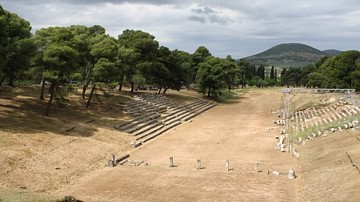The ancient Greeks left the world such an impressive legacy of ideas that many of them were seen for centuries in the civilizations that followed and, even today, cultures around the world continue to display many of the quintessential features of life in ancient Greece. In this collection of resources, we examine such lasting ideas as democracy, the architectural orders, the Olympic Games, the Hippocratic oath, drama and Pythagoras' theorem. We also look at such now-familiar structures as the theatre and stadium, and the lasting influence of the Greeks' great contribution to world literature, Homer's Iliad.
Sporting competitions had already been seen in the Minoan and Mycenaean civilisations of the Bronze Age Aegean, but it was in Archaic Greece that a sporting event would be born which became so popular and so important that it was even used as a reference for the calendar. The first Olympic Games were held in mid-July in 776 BCE at Olympia in honour of the Greek god Zeus. Every four years, thereafter, athletes and spectators gathered from across the Greek world to perform great sporting deeds and win favour with the gods. The last ancient Olympics would be in 393 CE, after an incredible run of 293 consecutive Olympiads.










